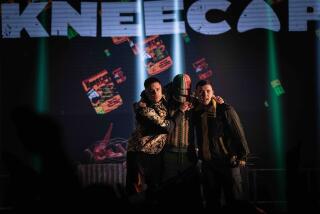‘PEACH’: SHARP PORTRAIT OF IRELAND
- Share via
There’s something jarringly familiar about the Irish landscape in Peter Ormrod’s “Eat the Peach” (at the Beverly Center Cineplex and Westside Pavilion). Instead of the Emerald Isle of “The Quiet Man,” with its gorse-covered hills, or the crisp modern battlegrounds of “Cal” and “Danny Boy,” the vistas in this slice of whimsy look a bit like the American Midwest. They have the same vast, flat stretches, slightly somber skies--even houses that resemble the prefab homes and converted trailers you often see on the edges of Midwestern cities.
And, like those areas of Ohio or Kansas where small farms collapsed and the life drained out, this clump of Ireland--in the Bog of Allen in County Kildare, near a peat-harvesting area--seems leached of energy. It’s abandoned: The local Japanese-owned computer factory decamps at the film’s beginning. Now, there’s only a bar here or there--and the TV sets--to enliven the gloom.
That emptiness stimulates the story--which charts a devious path toward curious triumph, sweetened despair, dubious hope. “Do I dare to eat a peach?” T. S. Eliot’s J. Alfred Prufrock once wondered--and in “Eat the Peach” some Kildare Irish seize a dream as improbable as Prufrock’s mermaids.
The two protagonists, visionary Vinnie (Stephen Brennan) and brother-in-law Arthur (Eamon Morrissey), inspired by the 1964 Elvis Presley movie “Roustabout,” decide to construct the same “wall of death” Elvis mastered in the film: a cylindrical track made of wood, around which the cyclist circles, 40 feet above ground, like a driver in a centrifugal drum. As they try to follow Elvis’ dream--wherever that dream may lead--their lives glide, almost imperceptibly, into poignant absurdity.
Jonathan Demme is listed as “presenting” the movie, and it’s easy to see why he was drawn to it. This comedy conceals some stingers beneath its amiable veneer. It’s a sharp portrait of the plight of modern rural Ireland, of families split apart by macho daydreaming, and of the strange penetration of American media-fantasies into foreign cultures.
Ormrod based his story on a real-life episode he covered as a reporter for Irish TV; the movie’s bittersweet climax replays what actually happened. And he’s added heightened local color--a smuggling subplot involving the British army anti-terrorist squad--and satirically drawn new characters, like the seedy entrepreneur, Boots (Niall Toibin).
There’s a flaw, however: The movie follow Vinnie’s viewpoint, and Ormrod never reveals or suggests what really drives him--whether he’s a crackpot, a hero or a bit of both. Brennan’s Vinnie never seems obsessive enough. He’s somehow too solid, too steady for the wild risks he undertakes.
Catherine Byrne’s Nora, Vinnie’s wife, is a bit less cloudy--and their daughter, Vicky (Victoria Armstrong), is a wonderfully uncliched child. As Arthur, Morrissey is perfect. He has a pale gleam in his eyes, a stern, craggy set to his jaw; he looks like a sidekick who’ll follow his buddy unquestioningly, but not untimorously, through hell. Best of all is Niall Toibin as Boots, a frayed free-lance wheeler-dealer who hangs out in the local bar, worships its honky-tonk Erin queen and cooks up stratagems to monopolize the public phone for his “enterprises.”
Boots’ regalia is pure “Dallas”: cowboy hat, high boots, a soiled, thrift-store version of a wildcat speculator’s get-up, accenting his cracked-voice savvy and weary opportunism. He’s an Americanophile to the core--concocted from wisps of TV shows and movie fantasies--and it’s a great moment when he confesses sadly that he’s never been there himself. Toibin takes this character, in some way a typical movie comedy oddball, and underplays him so subtly and skillfully that he becomes hilariously real, gently moving. He and Morrissey, and the low-key poetry of those Irish landscapes, are reason enough to sink your eyeteeth into the casual succulence of “Eat the Peach” (Times-rated: Family).
More to Read
Only good movies
Get the Indie Focus newsletter, Mark Olsen's weekly guide to the world of cinema.
You may occasionally receive promotional content from the Los Angeles Times.









